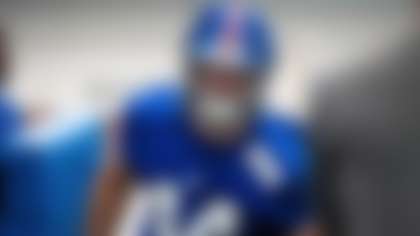The wild-card game between the Colts and Chargers was more than just a must-see instant classic that delighted fans and plumped up the NFL's already-stratospheric television ratings. San Diego's 23-17 overtime win over Indianapolis also harkened back to moments and records of football's storied playoff past. Odd coincidences, eerie parallels and fascinating connections between "then and now" flowed in abundance.
Where to begin? Let's start with the overtime itself. There are now 25 NFL postseason contests that have extended into extra innings. The first occurred 50 years ago when the then Baltimore Colts (wearing their road white uniforms) beat the New York Giants (in their home blue jerseys) 23-17 to win the 1958 NFL Championship. Flash forward to last Saturday, where the now Indianapolis Colts (adorned in the same road whites as their ancestors a half-century ago) lost to the San Diego Chargers (sporting their powder blue shirts) by the same 23-17 score. Back in '58, the Colts sent the game into OT with a field goal in the final moments to knot the game at 17. This time, it was the Chargers' kicker who completed the comeback from a 17-14 deficit with a three-pointer in the closing minute.
The Chargers' most prodigious performer was running back Darren Sproles, who wasn't even in the starting lineup. But after first-string tailback LaDainian Tomlinson realized his groin injury was too much to overcome, San Diego's "Little Big Man" stepped in for his wounded teammate, posting 328 all-purpose yards (105 rushing, 45 receiving, 106 on kickoff returns and 72 on punt returns). Sproles' output was the third-highest total in playoff history, yet it wasn't even the most ever by a Charger. That team record -- 329 -- is held by fullback Keith Lincoln, who saved his outburst for the 1963 American Football League title game. That day, Lincoln single-handedly demolished the Boston Patriots, rushing for 206 yards to go with 123 receiving yards, plus 20 more on a pass completion. The 51-10 "Boston Massacre" remains the only championship in Chargers franchise history.
Sproles wasn't the only Charger to put up big numbers last Saturday. It's usually pretty difficult to muster up enthusiasm for a punter's performance, but Mike Scifres' showing against Indy will go down as one of the finest in NFL history. Scifres averaged a league-record 51.7 net yards on six punts, continuously pinning the Colts deep in their own territory. It allowed the Chargers to dominate in overall field position, giving them a shorter surface to work with when Peyton Manning and friends were forced to punt. Here's another odd coincidence: the NFL's all-time punting average for a single game (regular or postseason) is 61.7, set in 1946 by the Lions' Bob Cifers (same pronunciation as San Diego's thunderfooted star).
Scifres also played a key role in the game-tying kick. With 33 seconds remaining, the Chargers lined up for what they hoped would be a Nate Kaeding field goal to knot the score at 17. It almost didn't happen. Long snapper David Binn's release came up on a hop, but Scifres, in his role as Kaeding's holder, scooped up the ball, set it in place and Kaeding drilled it through. Overtime followed, where Scifres' services were not required, thanks to Sproles' game-winning touchdown run.
The Chargers can now add to their playoff lore this week as they head into Pittsburgh. San Diego has never won a regular-season game in the Steel City (now 0-13 after this season's 11-10 loss in November). But in the playoffs the Bolts are 2-0 in "The 'Burgh," with victories in 1982 and the '94 AFC title game. Although clear underdogs, the Chargers would be happy to rewrite history once again with a postseason win this Sunday.



